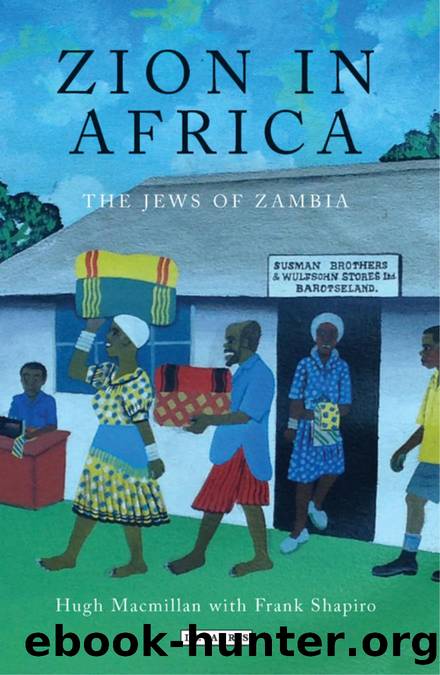Zion in Africa by MacMillan Hugh;Shapiro Frank;

Author:MacMillan, Hugh;Shapiro, Frank;
Language: eng
Format: epub
Publisher: I. B. Tauris & Company, Limited
Published: 2019-12-06T00:00:00+00:00
Lusaka Cold Storage
As the war ended, Abe moved to Lusaka. After a visit to South Africa in 1945, he married Vera Harris, whom he met through his brothers in Johannesburg. The newly married couple rented a house from George Hurwitz in which electricity had just been installed, but the toilets were outside. There were still no street lights in the town, and the fuel used for cooking was wood and charcoal. The town was still liable to annual floods, and the stream which runs down the centre of Cairo Road had not yet been covered.
Abe had invested some of the proceeds of his Mongu ventures in buying out âTubbyâ Wulfsohnâs share in a Lusaka butchery. He then found himself in partnership with E. W Dechow, who had been the general manager of Werners butcheries until the previous year. Dechow was a heavy drinker and Abe saw his capital rapidly eroding. The partnership was gazetted in August, and dissolved in October, 1945.3 Dechow then handed over his share in the business in settlement of a debt, and Abe became the sole owner of the Lusaka Butchery with its main branch in Cairo Road, and another in the second-class trading area. He soon found that he had ventured into a business in which competition was fierce. In Lusaka itself the main opposition came from the veteran Sam Haslett, a Scotsman who had acquired fame as a cattle trader and auctioneer in Northern Rhodesia before the First World War. Haslett eventually agreed to merge his business with Abeâs, but he insisted that his manager should become a partner in the combined firm. Haslett had rejected Abeâs original offer of commercial cooperation, but was persuaded to change his mind when he lost an important government contract to him. Haslett found it particularly galling that, after forty years in the country, he should lose the contract to a younger man when they had both tendered for the same price â six pence and three farthings a pound. Abe attributed his success to the contacts that he had made, and the reputation for honest business which he had acquired, during his years in Barotseland. The new firm, Lusaka Cold Storage Ltd, was registered in January 1946, and continues to occupy Haslettâs site on Cairo Road until the present day.4
The opposition now came from the big meat firms, especially Werners. The battle here was not over markets, as Abe could not threaten their mine contracts or their Copperbelt retail business, but over sources of supply. When Abe undertook to buy 300 head of cattle from a sympathetic Afrikaner farmer, who usually sold to Werners, Max Barnett, Wernersâ new manager, was not amused. The farmer was warned that Abe did not have £3,000 in ready money with which to pay. When the farmer demanded cash down, Abe told him that he would be back in two hours with the money. He managed to persuade a bank manager to give him an immediate and unsecured loan of £4,000. Northern Rhodesian banks were not in the habit of gambling, but Abeâs powers of persuasion were unusual.
Download
This site does not store any files on its server. We only index and link to content provided by other sites. Please contact the content providers to delete copyright contents if any and email us, we'll remove relevant links or contents immediately.
| Central Africa | East Africa |
| North Africa | Southern Africa |
| West Africa | Algeria |
| Egypt | Ethiopia |
| Kenya | Nigeria |
| South Africa | Sudan |
| Zimbabwe |
Goodbye Paradise(2965)
Men at Arms by Terry Pratchett(2406)
Tobruk by Peter Fitzsimons(2062)
Pirate Alley by Terry McKnight(1909)
Arabs by Eugene Rogan(1836)
Borders by unknow(1786)
Belonging by Unknown(1467)
The Biafra Story by Frederick Forsyth(1323)
It's Our Turn to Eat by Michela Wrong(1301)
Botswana--Culture Smart! by Michael Main(1238)
A Winter in Arabia by Freya Stark(1225)
Gandhi by Ramachandra Guha(1196)
Coffee: From Bean to Barista by Robert W. Thurston(1181)
Livingstone by Tim Jeal(1152)
The Falls by Unknown(1142)
The Source by James A. Michener(1135)
The Shield and The Sword by Ernle Bradford(1101)
Egyptian Mythology A Fascinating Guide to Understanding the Gods, Goddesses, Monsters, and Mortals (Greek Mythology - Norse Mythology - Egyptian Mythology) by Matt Clayton(1088)
Africa: Altered States, Ordinary Miracles by Richard Dowden(1078)
